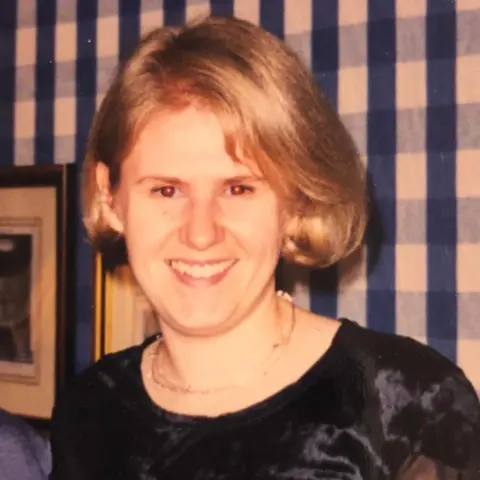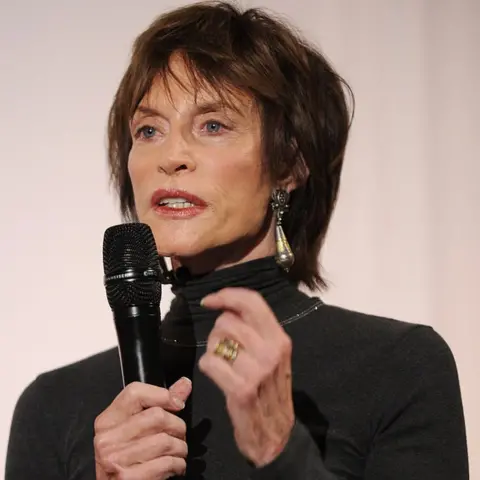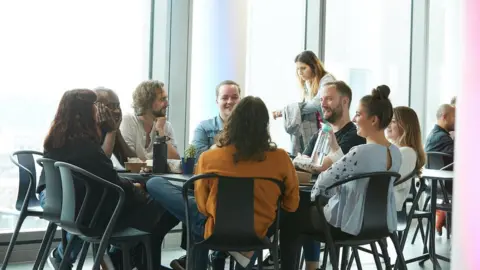The CEO taking action on workplace policies for women
There is a graphic image of female empowerment seared in to Fiona Gordon's memory.
In the early 1990s, she was an impressionable young graduate, just starting her career in advertising. She attended a company event where a woman took to the stage to speak.
The imprinted image is of red high heels decorated as billiard balls.
The owner of the striking shoes was Ogilvy's global CEO at the time, Charlotte Beers. "She had this 'statement look' to magnify her persona," says Ms Gordon, "I remember just thinking, 'gosh, a woman can really get up to that position'."
In early 2021, Ms Gordon became CEO of Ogilvy UK. In the intervening three decades the advertising industry has made some progress towards becoming more gender-balanced, with representation of women in the workforce increasing - although it still has some way to go.
Inspired by those unforgettable shoes, Ms Gordon says she wants to make her own statement by bringing very practical changes in to the workplace that benefit women.
 Fiona Gordeon
Fiona GordeonAs an English Literature graduate, Ms Gordon was first attracted to advertising as it offered a mix of business and creativity.
The industry was starting to lose its male-dominated, macho, ethos by 1992 when she joined, according to Ms Gordon. This was the kind of culture epitomised by the Mad Men TV series set in the 1960s, a time when male executives had big offices and bigger egos.
"There was casual sexism when I started out, but not really overt," remembers Ms Gordon.
She says, these days "feistiness" and a "Scottish no-nonsense" attitude helps her quash it when she encounters it. Because she says it is still there.
A campaign launched in 2018 called #timeTo gained traction before the pandemic, setting out to challenge everyday sexism in advertising firms, backed by groups like the Advertising Association and Women in Advertising and Communications. It built on the work of the Bloom network which captured examples of everyday, workplace sexism, with women opening up about the derogatory remarks that had been made about them.
Initiatives like the HERoes Women Role Model Lists have gained ground and Ms Gordon is part of a bigger trend of women taking up senior roles across the industry who want to change the rules.
There weren't so many women in CEO positions a generation ago, which made Charlotte Beers and her trademark heels even more striking - and an appealing role model.
 Andrew Toth
Andrew Toth"She was intelligent and feisty, and you could imagine she would hold a room of clients in her hand. She had an incredible presence that motivated and excited everyone."
"When I became CEO, I wrote a little note to myself saying what would my 'starter self' have dreamed of, what would 22-year-old Fiona want me to create?"
Ms Gordon decided her mission statement would involve helping women stay in the workforce for longer, so they could always see a long-term future with the firm.
"As you hit your fifties, historically, in our industry, a lot of women would start to disappear, and I wanted to make sure we did something practical and tangible to help them stay."
Her first practical intervention into workplace culture has been introducing a menopause and perimenopause policy at Ogilvy UK.
This is still an unusual move for most companies, menopause is not explicitly recognised in UK employment law, so it is currently very hard for employees to use it for any protection.
The Equality Act of 2010 brought together the law on discrimination around sex, disability and age, meaning anyone struggling at work specifically due to menopause would have have to seek recourse through these separate pieces of law.
At Ogilvy UK, employees going through menopause and perimenopause are entitled to private medical support from a trained professional as well as flexible working. Monthly meetings give time for workers to discuss the issue with colleagues and hear from visiting experts - line managers have also been trained on how to discuss it with team members.
The Ogilvy UK policy is designed to raise awareness across the whole workforce, so anyone can spot menopause symptoms. She was recently inspired by Davina McCall'sChannel 4 documentary "Sex, Myths and the Menopause". "Men want to understand more too, and we want to normalise conversations around it," she adds.
 Ogilvy
OgilvyMs Gordon's other big intervention in workplace culture involves the issue of domestic violence. Motivation for this comes from witnessing the effects of the pandemic, she explains.
"[The distinction between] home and work blurred, so, as an employer, your role pivoted from just thinking of people at work, to thinking about people in their life.
"We've all seen into people's lives over the last two years [on video calls], their kids, their wallpaper, their dogs, so you do have a [new] responsibility to help employees turn up at their best.
"The office is a safe haven for people and we realised relationships have been so strained. The pandemic has put big stress on people and we had to address it."
Charity, SafeLives, is training 25 of her employees a year to spot the signs of domestic abuse and respond. Ogilvy will fund a week's temporary accommodation for anyone who needs to flee domestic abuse and they are also given 10 days additional paid leave. There is also a financial emergency assistance fund in place.
There is little support in UK employment law for employees experiencing domestic violence, if, for instance, a worker is sacked over a drop in work performance after fleeing a partner, or a need for extra leave to move in to a shelter, there would be no legal protection for that employee.
"In the past, people maybe thought people working in shiny offices didn't experience all life's problems. The pandemic has shown us that's not the case," says Ms Gordon.

If the domestic violence policy is a direct response to the pandemic, Ms Gordon says she feels she is more personally invested in the menopause policy.
"I want to help other women succeed. I want anyone going through menopause to feel they don't need to leave work to look after themselves - yes, that one's personal for me."
"The critical thing as a female CEO is to [go beyond] just talk and take important action that can affect people's lives."
"My 22-year-old self would say 'Don't procrastinate now you're CEO, get on with it'. She was quite pushy."
CEO Secrets interview by business reporter Dougal Shaw: @dougalshawbbc. More from the series here.
